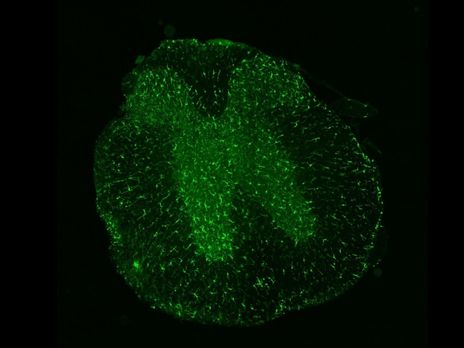
Molecular Therapies
The remarkable advances in molecular biology in the past decades have led to a better understanding of the mechanisms implicated in the pathophysiology of many CNS disorders as well as mechanisms that control axonal regeneration…

Adriana Gonçalves completed her BSc in Biochemistry in 2019 and her master’s degree in health sciences in 2022, both at the University of Minho. She is currently a PhD student in the ReNEU team in ICVS, at the University of Minho, supervised by Dr. Pedro Ferreira and in the GHTM/IHMT, at the University of Nova Lisboa, supervised by Dr. Pedro Cravo. During her bachelor project and master’s thesis, she developed genetically edited malaria parasites in order to study resistance to antimalarials in Plasmodium falciparum. In her PhD, she wants to uncover the role of the proteasome in the resistance of artemisinin. She also participated in other projects, such as “MalPharm – A genetic sensors-based highthroughput screening platform for antimalarial development” and “Mechanisms of action and resistance to the antimalarial Purydrazide”. Her scientific interest is mainly related to the mechanisms of drug resistance in malaria and genetic variations involved in that, as well as the role of the proteasome in artemisinin response.

Adriana Gonçalves completed her BSc in Biochemistry in 2019 and her master’s degree in health sciences in 2022, both at the University of Minho. She is currently a PhD student in the ReNEU team in ICVS, at the University of Minho, supervised by Dr. Pedro Ferreira and in the GHTM/IHMT, at the University of Nova Lisboa, supervised by Dr. Pedro Cravo. During her bachelor project and master’s thesis, she developed genetically edited malaria parasites in order to study resistance to antimalarials in Plasmodium falciparum. In her PhD, she wants to uncover the role of the proteasome in the resistance of artemisinin. She also participated in other projects, such as “MalPharm – A genetic sensors-based highthroughput screening platform for antimalarial development” and “Mechanisms of action and resistance to the antimalarial Purydrazide”. Her scientific interest is mainly related to the mechanisms of drug resistance in malaria and genetic variations involved in that, as well as the role of the proteasome in artemisinin response.

The remarkable advances in molecular biology in the past decades have led to a better understanding of the mechanisms implicated in the pathophysiology of many CNS disorders as well as mechanisms that control axonal regeneration…



Phone: +351 253 604 967
Fax: +351 253 604 809
Email: icvs.sec@med.uminho.pt
Life and Health Sciences
Research Institute (ICVS)
School of Medicine,
University of Minho,
Campus de Gualtar
4710-057 Braga
Portugal

Copyright ©2025 ICVS. All Rights Reserved. Developed by TCIT



Copyright ©2025 ICVS. All Rights Reserved. Developed by TCIT
Life and Health Sciences
Research Institute (ICVS)
School of Medicine,
University of Minho,
Campus de Gualtar
4710-057 Braga
Portugal



Copyright ©2025 ICVS. All Rights Reserved
Life and Health Sciences
Research Institute (ICVS)
School of Medicine,
University of Minho,
Campus de Gualtar
4710-057 Braga
Portugal

